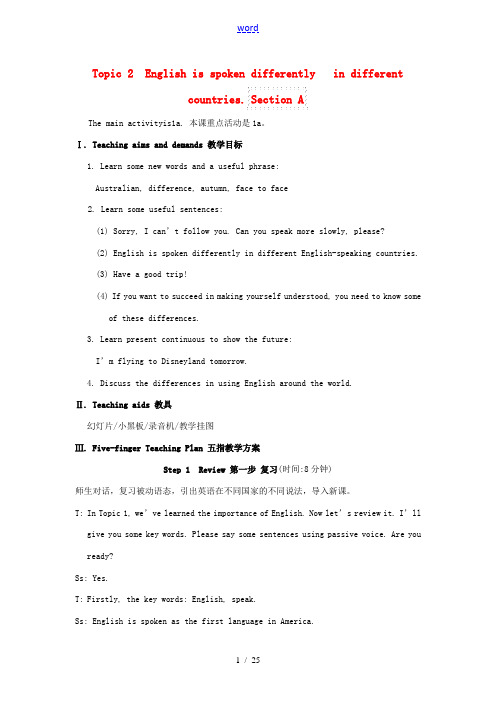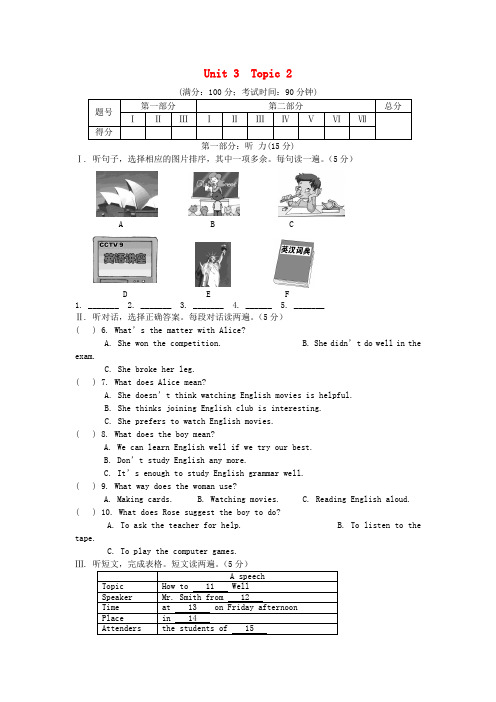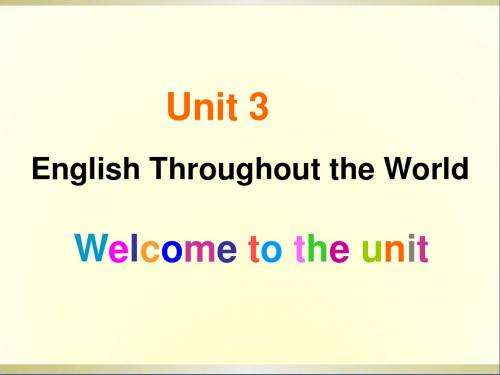福建省漳州九年级英语上册《Topic 2 English is spoke
- 格式:doc
- 大小:1.22 MB
- 文档页数:9

Topic 2 English is spoken differently in differentcountries.Section AThe main activityis1a. 本课重点活动是1a。
Ⅰ. Teaching aims and demands 教学目标1. Learn some new words and a useful phrase:Australian, difference, autumn, face to face2. Learn some useful sentences:(1) Sorry, I can’t follow you. Can you speak more slowly, please?(2) English is spoken differently in different English-speaking countries.(3) Have a good trip!(4) If you want to succeed in making yourself understood, you need to know someof these differences.3. Learn present continuous to show the future:I’m flying to Disneyland tomorrow.4. Discuss the differences in using English around the world.Ⅱ. Teaching aids 教具幻灯片/小黑板/录音机/教学挂图Ⅲ. Five-finger Teaching Plan 五指教学方案Step 1 Review 第一步复习(时间:8分钟)师生对话,复习被动语态,引出英语在不同国家的不同说法,导入新课。
T: In Topic 1, we’ve learned the importance of English. Now let’s review it. I’ll give you some key words. Please say some sentences using passive voice. Are you ready?Ss: Yes.T: Firstly, the key words: English, speak.Ss: English is spoken as the first language in America.T: Well done! Next: English, use.Ss: English is widely used throughout the world.…T: Good on ya, mate! Can you understand me?Ss: Sorry, we can’t.T: I just said “Well done!”In Australia, people use the words “Good on ya, mate!”instead of “Well done!”(板书)Good on ya, mate! = Well done!T: In fact, though English is widely spoken around the world, there are some differences among American English, British English, Canadian English and Australian English. What are the differences between them? Please read 1a and find out the answers.(板书并要求学生掌握difference和Australian;理解British。

轧东卡州北占业市传业学校Unit 3 Topic 1 English is widelyspoken around the worldⅠ.从A、B、C、D四个选项中选出可以填入空白处的最正确答案。
单项选择。
(10分)( )1.—What a nice classroom!—It _____ every day. A.is cleaning B.has cleaned C.must clean D.is cleaned ( )2.It is _____ that every student must go to school on time.A.clearedB.clearC.clearlyD.to clear( )3.China takes the leading position _____ space industry.A.inB.atC.ofD.up( )4.Teachers should _____ their students to practice _____ English as much as possible.A.encourage, speakingB.let, speakC.make, speakD.keep,speaking( )5.Maria has _____ trouble _____ math, so she often asks her math teacher for help.A.much, understandingB.no, withC.many, understandingD.not, to understand( )6.If you have a chance _____ in a university, you shouldn’t give it up.A.studyB.studyingC.to studyD.studied( )7._____ of the students in our class _____ girls.A.Three fives, isB.Three fifths, isC.Three fifth, areD.Three fifths, are( )8.I bought a T-shirt yesterday. It was similar_____yours.A.forB.toC.ofD.from( )9.—What is a writing brush used for?—It’s used _____ writing and drawing.A.asB.toC.forD.by( )10._____, I must try my best to study English.A.On purposeB.From now onC.After allD.As soon asⅡ.情景交际。

Unit2 Topic2Section AI. 根据句意,用括号内所给提示完成句子。
1. I have forgotten it____________[kəm'pliːtlɪ].2. A lot of water can be ____________(贮存) by forests.3. Two thirds of the country is dry or___________ ['dezət].4. In the next few days , there will be a____________ (沙暴).5. Everyone need to try their best to____________ (减少) pollution.6.____________ (虽然)my grandfather is old, he looks very strong and healthy.II.根据汉语意思完成句子。
1.才过了一会儿,很多冰块变成了水。
After a while, a lot of ice has __________ __________water.2.树能够防止土壤被水流带走Trees can stop the water__________ __________the earth _______.3.外面的风刮得厉害,我们必须马上回家。
The wind __________ is __________ __________, we have to go home right now.4.我在街上走的时候,什么也看不清。
While I was ___________ __________the street just now, I couldn’t _________ _________.5.滥伐树木对人类、动植物都有害处。
___________ __________ trees is harmful to __________ __________, animals and plants.Unit2 Topic2Section BI. 根据句意,用括号内所给提示完成句子。

Unit 3 Topic 2第一部分:听力(15分)Ⅰ. 听句子,选择相应的图片排序,其中一项多余。
每句读一遍。
(5分)A B CD E F1. _______2. _______3. _______4. ______5. _______Ⅱ. 听对话,选择正确答案。
每段对话读两遍。
(5分)( ) 6. What’s the matter with Alice?A. She won the competition.B. She didn’t do well in the exam.C. She broke her leg.( ) 7. What does Alice mean?A. She doesn’t think w atching English movies is helpful.B. She thinks joining English club is interesting.C. She prefers to watch English movies.( ) 8. What does the boy mean?A. We can learn English well if we try our best.B. Don’t study English any more.C. It’s enough to study English grammar well.( ) 9. What way does the woman use?A. Making cards.B. Watching movies.C. Reading English aloud. ( ) 10. What does Rose suggest the boy to do?A. To ask the teacher for help.B. To listen to the tape.C. To play the computer games.Ⅲ.11._____ 12._____ 13._____ 14._____ 15._____第二部分:笔试(85分)Ⅰ. 单项选择。


Unit 2 Saving the Earth满分150分,考试时间120分钟一.听力(共三节,20小题,每小题1.5分,满分30分)第书听听下面五个司子,分每小题所给的三幅图中选出与句子内容相符的选项。
(每子读两遍)第二节听对话听下面七段对话,从每小题所给的A、B,C三个选项中选出正确答案。
(每段对话读两遍)听第1段对话,回答第6小题。
6.What was the TV program about?A.Sports.B.Pollution.C.Music.听第2段对话,回答第7小题。
7.Where are the two speakers going?A.The Forest Park.B.The Green Zoo.C.The school library.听第3段对话,回答第8小题。
8.What's the woman's problem?A.She doesn't want to work in the factory.B.She didn't have supper at home.C.She can't sleep well at night.听第4段对话,回答第9小题。
9.What are the two speakers going to do?A.They're going to report the pollution.B.They are going to frighten the factories.C.They are going to visit the factories.听第5段对话,回答第10、11小题。
10.Where has Rose been?A.To a chemical factory.B.To a shoe factory.C.To a paper factory.11.What did Rose find out about the factory?A.She found that the factory was throwing waste bags here and there.B.She found that the factory was throwing rubbish into the river.C.She found that the factory was pouring waste water into the river.听第6段对话,回答第12、13小题。
九年级英语上册 Unit 3《Topic 2 English is spoken differently in different countries》section C 教学设计仁爱版The main activities are 1a and 2. 本课重点活动是1a和2。
Ⅰ. Teaching aims and demands 教学目标1. Learn some new words and expressions:pronounce, pronunciation, fill in, in person2. Discuss the differences between British English and American English inspelling,pronunciation and expression.Ⅱ. Teaching aids 教具录音机/卡片/小黑板Ⅲ. Five-finger Teaching Plan 五指教学方案Step 1 Review 第一步复习(时间:10分钟)1. (教师检查作业,引导学生复习Section A中讲英语的不同国家英语表达的不同。
)T: Hello! Boys and girls, we learned differences in English among different English-speaking countries in Section A. Now I’ll ask a group to perform in the front. S1, S2,would you like to show us your dialog?S1: Hello, what should people say when they meet other people in Britain?S2: Hello, but what about in Australia?S1: G’day instead.S2: What should people say when someone did something well in Britain then?S1: Well done! And what about in Australia?S2: Good on ya, mate.S1: …S2: …T: They did a good job, didn’t they?Ss: Yes, they did.T: W hat should we say to them, class?Ss: C ongratulations!T: Yeah. Congratulations to them. (学生鼓掌)(复习此对话中表达法的不同,目的是为导入1a英语国家在发音、拼写、表达三方面的差异做铺垫。
九年级英语上册 Unit 3《Topic 2 English is spoken differently in different countries》section B 教学设计仁爱版The main activities are 1a and 1c. 本课重点活动是1a和1c。
Ⅰ. Teaching aims and demands 教学目标1. Master some new words and useful expressions:put out, ask for a ride, victoryThe foreigner is asking for a ride.I’m just kidding.2. Go on learning present continuous to show the future:(1)I’m leaving for California.(2)My uncle is meeting us tomorrow.(3)When are you leaving for Disneyland?3. Talk about sign language and body language.Ⅱ. Teaching aids 教具录音机/小卡片/图片/机票Ⅲ. Five-finger Teaching Plan 五指教学方案Step 1 Review 第一步复习(时间:12分钟)1. (教师出示一张飞机票的图片,导入本课语法和生词。
)T: Nice to see you again, class.Ss: Nice to see you again, my dear teacher.T: I’m sorry to tell you that I can’t have English classes for you next week.I’m leaving for Beijing to have an important meeting this weekend. It’s my plane ticket.…, we want to see you off.) T: My flight will take off at 7:00 p.m.. You needn’t see me off. If you have any difficulty in studying English, you can ask Mr. Hu for help. OK?Ss: OK.T: A t the same time, try your best to get ready for next week’s exam. I hope you will have a victory in it.(板书)victory。
九年级英语Unit 3 Topic 2 English is spoken differently in different countries (1) 湘教版【本讲教育信息】一. 教学内容:Unit 3 English around the World.Topic 2 English is spoken differently in different countries. (1)二. 重点、难点:单词:句子:【学海导航】【金点剖析】【金点1】I can’t follow you. Can you speak more slowly, please? 我听不懂你的话,请你讲慢一点好吗?follow 在本句中作understand讲,意为“理解,明白”。
如:I didn’t quite follow what he said.我不太明白他说的话。
【金点2】By the way, I’m flying to Disneyland tomorrow. 顺便说一下,明天我将飞往迪斯尼乐园。
am+ flying 从形式上看是现在进行时,但实际上是表示将来。
(1)一些表示位置转移的动词,如:go, e, leave, fly, arrive, drive, travel等。
常用现在进行时表示即将发生的动作。
如:I’m going. 我要走了。
When are you starting? 你什么时候动身?Uncle Wang is ing to have supper. 王叔叔要来吃晚饭。
(2)用现在进行时表示将来除用于位移动词外,亦可用于某些非位移动词。
如:sleep, take, change, work, see, buy, meet等等。
如:I am meeting you after class. 课后我来找你。
【即时演练】1. My mother _________(leave) for Hong Kong next week.2. They ________(e) tomorrow.3. I _________(fly) to Rome the day after tomorrow.【金点3】If you want to succeed in making yourself understood, you need to know some of these differences. 如果你想成功地表达自己的意思,你需要了解一些英美英语的差异。
Unit 2 Topic 1Section AI. 根据句意,用括号内所给提示完成句子。
1. Her hair is in a terrible___________ [mes].2. She was full of _____________(羞愧)at her bad behavior.3. I haven’t seen him for______________ ['sevrəl]days.4. Please ___________ [pɔː(r)] the water into the pot.5. Playing computer games is a __________(浪费)of time.6. Cars not only____________(污染)the air in cities, but make them crowded.II. 根据汉语意思完成句子。
1.一切都改变了。
__________ has ___________.2.农民们砍掉了山上的树。
The farmers ____________ ____________ the trees in the hill.3.他们打算这个周末去野餐。
They ___________ ____________ a picnic for Saturday.4.人们可以看到蝴蝶和花在花丛中飞舞。
People can ____________ bees and butterflies ____________around the flowers.5.由于村民的破坏,花和草都没了。
The flowers and grass __________ ___________because the villagers___________ them.Unit2 Topic1Section BI. 根据句意,用括号内所给提示完成句子。
1. No____________ [peɪn], no gain.2. Fish cannot ___________ (呼吸) out of water.3.The bad air makes my ____________ [tʃest]hurt.4. We should reduce the waste we ___________(生产).5.He can’t____________[beə(r)] having a cat in the house.II.从方框中选择恰当的短语,并用其适当形式填空。
Unit 3 Topic 2题号第一部分第二部分总分ⅠⅡⅢⅠⅡⅢⅣⅤⅥⅦ得分第一部分:听力(15分)Ⅰ. 听句子,选择相应的图片排序,其中一项多余。
每句读一遍。
(5分)A B CD E F1. _______2. _______3. _______4. ______5. _______Ⅱ. 听对话,选择正确答案。
每段对话读两遍。
(5分)( ) 6. What’s the matter with Alice?A. She won the competition.B. She didn’t do well in the exam.C. She broke her leg.( ) 7. What does Alice mean?A. She doesn’t think w atching English movies is helpful.B. She thinks joining English club is interesting.C. She prefers to watch English movies.( ) 8. What does the boy mean?A. We can learn English well if we try our best.B. Don’t study English any more.C. It’s enough to study English grammar well.( ) 9. What way does the woman use?A. Making cards.B. Watching movies.C. Reading English aloud. ( ) 10. What does Rose suggest the boy to do?A. To ask the teacher for help.B. To listen to the tape.C. To play the computer games.Ⅲ.A speechTopic How to 11 WellSpeaker Mr. Smith from 12Time at 13 on Friday afternoonPlace in 14Attenders the students of 1511._____ 12._____ 13._____ 14._____ 15._____第二部分:笔试(85分)Ⅰ. 单项选择。
(10分)( ) 1. — Hey, where are you going?— Oh, I’m _____ Hong Kong.A. leave toB. leaving forC. leave forD. leaving to( ) 2. Miss Xu is flying to Beijing, so we’re going to _____ at the airport.A. see her offB. see off herC. send her toD. send to her ( ) 3. — How was the weather yesterday?— It was terrible. It rained _______. People could _______ go out.A. hardly; hardlyB. hardly; hardC. hard; hardD. hard; hardly ( ) 4. Your idea sounds_____, but I don’t have any_______ in it.A. interested; interestB. interesting; interestC. interesting; interestedD. interested; interesting( ) 5. I’m going to learn_______ second language in ______ third grade.A. a; theB. a; aC. the; theD. the; a( ) 6. I really want to know how the differences between American English and British English _____.A. came aboutB. came outC. came inD. came after( ) 7. The old man is putting out his hand and it seems that he is _____ for ride.A. wantingB. would likeC. askingD. prefer( ) 8. The little girl _____ go to school, though she didn’t want to go there.A. wanted toB. was forced toC. is forced toD. liked to( ) 9. — Tomorrow I’m flying to Hainan.— _____A. Thank you.B. Have a good trip!C. Best wishes!D. Yes.( ) 10. Australians use the words, “Good on ya, mate!” instead of “_____”A. Well!B. Well done!C. Good!D. OK!Ⅱ. 情景交际。
(5分)从方框中选出适当的句子补全对话,其中有两项是多余的。
( It’s Saturday. Lin Tao and Jim are talking about what they’re going to do tomorrow. )A: Hi, Jim! 11 What are you going to do?B: I’ve no idea. 12A: I’m going to work on my uncle’s farm. Would you like to come with me?B: I’d love to very much. 13A: About 15 kilometers. We can go there by bus.B: When are we going to leave?A: 14 It will take us about half an hour to get there.B: Why not make it a little earlier? Then we can work there longer.A: OK. Let’s make it six thirty then.B: Great! 15A: Let’s meet at the bus stop.B: All right. See you then.A: See you tomorrow.Ⅲ. 完形填空。
(10分)I still remember I fell in love with English from a very young age, because I thought it was such a(n) 16 language. Full of strong wishes of learning English, I began to 17 it . But soon I found it 18 than expected. There were too many words, expressions and many other things to remember. And even if you knew 19 , you could n’t use them correctly and exactly. And I did rather 20 in my first English test. I was worried about it. This made me upset(不安) and dropped my interest in English 21 .While I was in trouble, my English teacher gave me much help. I knew that interest didn’t mean 22 and I should have some learning methods. I did as he said and tried many different ways of learning English. 23 the days went by, I could do better and better and became more and more interested in it.During the summer vacation, an old lady from Australia visited my school. She had a talk with us. It was the first time 24 a foreigner. I got 25 nervous at first, but soon I found it exciting to talk with her, and I learned a lot from her. How I wish to practice speaking English with foreigners every day!( ) 16.A. helpful B. wonderful C. exciting D. careful ( ) 17.A. read B. teach C. learn D.write( ) 18.A. better B. more difficult C. worse D. easier( ) 19.A. how to write them B. how to writeC. what to write themD. what to write( ) 20.A. well B. worse C. better D.badly( ) 21.A. one by one B. one another C. little by little D. each other( ) 22.A. everything B. anything C. nothing D. something ( ) 23.A. When B. As C. While D. For( ) 24.A. to talk B. speak C. to meet D. meet( ) 25.A. a little B. little C. a few D.fewⅣ. 阅读理解。